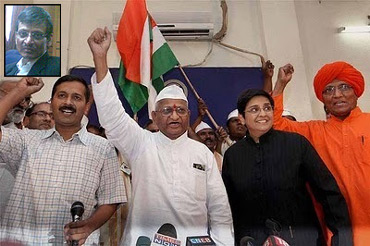
Fearing that they are 'questioning the entire democratic system,' Advocate ML Sharma moved the Supreme Court recently opposing the inclusion of five civil society members in a parliamentary committee to draft the Jan Lokpal bill.
Advocate Sharma had shot to fame when he moved the Supreme Court opposing the nomination of Pratibha Patil as a Presidential nominee as she was an undischarged insolvent in relation to her co-operative bank.
He had said that the United Progressive Alliance presidential nominee had collected money from her employees for the Kargil war relief fund, but had not deposited it in the fund.
In this interview with rediff.com's Sahim Salim, Sharma says that he is not against an effective Lokpal bill, but that he is against the inclusion of five members, who by "no stretch of imagination represent the public."
He also says that in the eyes of the public, Anna Hazare and the others want to be seen as the founders of Lokpal bill, while the bill originally was the idea of former prime minister Indira Gandhi.
...
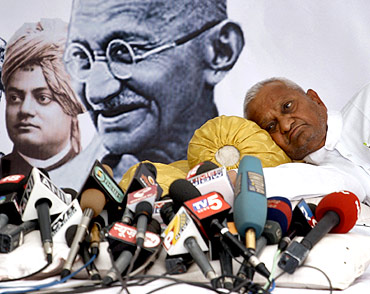
Despite increasing mass support to Anna Hazare's campaign, what was the reason for your filing of a PIL challenging the setting up of a joint Lokpal bill drafting committee?
I am not against the Lokpal bill, but against the process adopted by these people in going about it. I am also against the compromise made by the government to bow in front of their demands.
We have a judicial and a constitutional system. In both of these systems, there are enough procedures in place to go about getting a change in the draft of a particular bill.
Nobody has the right to grab the entire system in their hand and question the very functioning of it. According to the existing system, even a common person is allowed to make a draft of a law, which can be handed over to the secretary of the Parliament, who will then hand it over to a committee of the Parliament, which can then be put in front of the Lok Sabha and Rajya Sabha.
It is a simple system. No protests, drama or fasting is required. I have a problem with the fact that they are destroying the democratic system in this country.
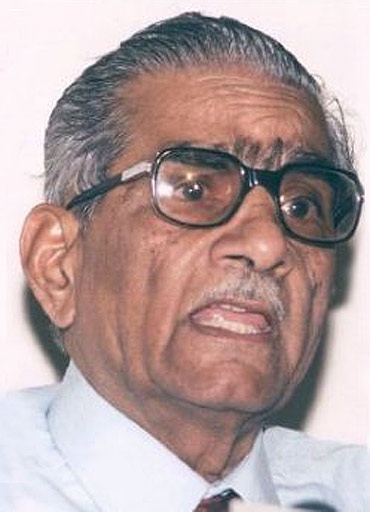
In your PIL, you have said that "inclusion of five civil society members in the drafting committee is constitutionally flawed". Can you explain this?
According to our system, only public representatives can be members of the House, and it is only them who can actually put a proposed bill in the House.
These five people cannot claim to be representatives of the public by any stretch of the imagination. Are they not making a mockery of our entire democratic system?
They demonstrated in Jantar Mantar, to which they got good media coverage and people joined in because they primarily looked upon these people to eradicate corruption. The entire so called 'joint committee' is constitutionally illegal.
Your PIL specifically targets Shanti and Prashant Bhushan. What are the charges you have leveled against them and why?
Nobody knows their real characters. I specifically stated in the PIL that they had personally appeared for underworld don Dawood Ibrahim in the Mumbai bomb blast case. I agree that they can defend anybody as an advocate, but my question is, how did they get paid?
I have asked in my PIL how this payment was made and if it is through hawala, then necessary provisions of the Indian Penal Code be invoked. Shanti Bushan also appeared for the Lashkar-e-Tayiba. How did the LeT pay him?
Secondly, they are law breakers. They bought a property worth crores for just Rs 1 lakh..
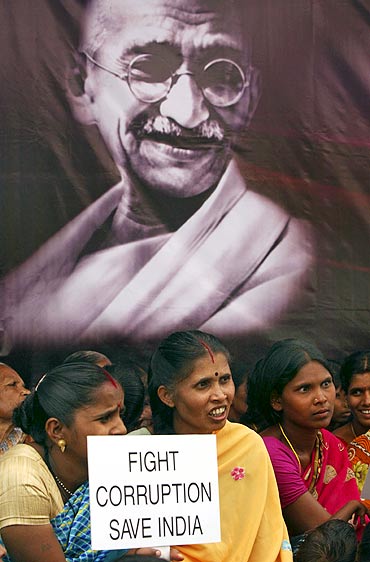
But they clarified saying that they had an agreement with the landowners in 1966 ?
Yes, I was coming to that. He can fool the public, but he cannot fool people who know the law. According to the law, no contract can be enforced after three years.
Three years is called the limitation. Both the agreements they have submitted in the court are dated in 1966. The suit was filed in Allahabad court in 2000. As per law, the judge himself should have quashed the suit because it is against the law.
They either threatened or bribed the judge to be on their side to get a non-maintainable suit in the court. They fought over the suit for five to six years, after which the buyer and seller made a show of coming to a compromise. What happened then? Over a property worth Rs 20 crore, both parties had to pay stamp duty and income tax of only Rs 1 lakh. They cheated the state and country to the tune of several crores.
In lieu of so many corruption cases and scams coming out in the public glare, don't you think there actually is a need for an effective Lokpal bill?
I am glad you asked this. In today's system, we have something called the Indian Penal Code, which covers every offence that can possibly be committed.
There is also the Prevention of Corruption Act, which covers every aspect of corruption. There is no dearth of laws in our country, where we lack is in its execution. Again, as I said, I am not against the Lokpal bill, but who will ensure in its execution? (Former prime minister) Narasimha Rao was prosecuted inspite of there being no Lokpal bill.
A system is in place, why is it not being used? Since Lokayukts have been appointed, how many ministers have been prosecuted till today? I personally ask Mr (Karnataka Lokayukta Dr Santosh) Hegde, has he recommended any minister to be prosecuted, inspite of him having powers in that state (Karnataka)?
My point is that the existing Prevention of Corruption Act is more powerful than any of the drafts of the Lokpal bill. What we need more at this stage than a Lokpal bill is the proper execution of Prevention of Corruption Act.
Have you studied the Lokpal bill prepared by the government? Don't you think that bill has absolutely no powers?
That bill has not been put up even for the general public. It is a simple draft. I am very much against Indira Gandhi, but she was the first one to actually come up with the concept of Lokpal bill, due to which I have immense respect for her.
She was the one to actually put the bill first in the house in 1968. It was put up again in 1969, but everyone kept reiterating that it should be more effective.
A committee was set up to improve the bill, but despite being put up repeatedly in the House, it was divided on its becoming a law. Lokpal bill is still at best a draft pending in the Parliament.
The bill has recommendations of various retired judges, politicians (including former PM Atal Bihari Vajpayee) and others. My demand is that the essence of the bill, the debates it had, the recommendations it had in its evolution for over 40 years should not be ignored and thrown into the basket.
That Lokpal bill should be published and debated in the public. Let people from every field give a view on it.
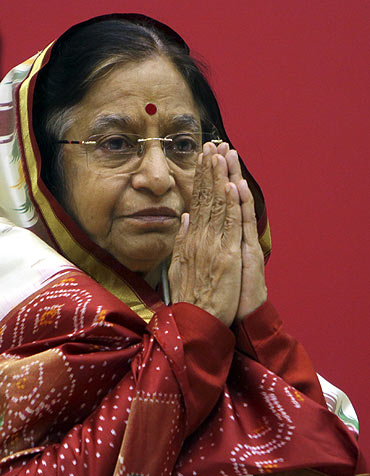
Representation and proxy are strong words. Infact, I don't know anyone from any political party. I don't like these politicians, which is not right on my side, but the fact is that they don't do their duties.
I was the one who had filed a PIL against UPA nominee Pratibha Patil as she was an undischarged insolvent in relation to her co-operative bank, Pratibha Mahila Co-operative Bank. It was not Shanti Bushan or Prashant Bhushan who filed a PIL in the court. How can you call me an agent of the government?
In your opinion, what should have been ideally done to get an effective anti corruption machinery in place?
I would have filed a PIL in the Supreme Court. Infact in this present PIL, I have included a paragraph to make the Lokpal bill from 1968 public.
There are various recommendations in the draft -- by judges, law commissions, politicians etc, which provide a lot of insight on how the bill should be.
This should be published for the public, who can then give suggestions and amend the bill for passing it effectively in the Parliament.
The only thing I would personally recommend is that its execution be guaranteed -- because without execution, every law is useless.